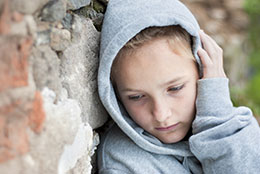22 August 2016
 Homeless young people are often referred to as “street kids” and “runaways” but the reality is most young people experiencing homelessness are hidden from view and aren’t homeless by choice.
Homeless young people are often referred to as “street kids” and “runaways” but the reality is most young people experiencing homelessness are hidden from view and aren’t homeless by choice.
Young people at risk are often alienated from their families, school and community and especially in regional areas there is a desperate need for collaborative approaches like the UniSA Regional Homelessness Intervention Project, recently announced by the South Australian Government.
UniSA’s Associate Head of the School of Psychology, Social Work and Social Policy, Associate Professor Deirdre Tedmanson, says the collaborative focus of the project will see UniSA researchers working closely with key non-government sector agencies Uniting Communities, SYC and local schools, community organisations and youth services to identify young people at risk and map appropriate responses.
“The most recent ABS statistics for South Australia show nearly 6000 people on any given night are homeless and of those more than 26 per cent are aged 18 years and under with 15.7 per cent being younger than 12 years old,” Prof Tedmanson says.
“Living in rural and remote locations adds an additional level of risk because there can be fewer options for education and employment, and a lack of access to services which can force young people to either leave and ‘make their own way’ or stay and face limited options.
“With this project we will be partnering with SYC and Uniting Communities to work collaboratively with local schools, families and youth services to identify those at risk and develop targeted support.
“It’s a project that is innovative, evidence based and responsive to local need.
“UniSA has regional campuses and well established local networks which will ensure a sound base for the project and we will also be working closely with youth homelessness expert Associate Professor David MacKenzie who will help us monitor the project’s local impact.
“Early intervention is a key to maximising family connectedness, strengthening young people’s social and emotional wellbeing and resilience so our hope is that we will be able to minimise homelessness in regional areas before it’s an issue.”
South Australia’s Minister for Youth, Zoe Bettison, says the State Government is providing UniSA with $300,000 funding over two years to pilot the Regional Homelessness Intervention Project to try and keep as many young people living at home, in school and linked to the community as possible.
“Decisions that young people make can have a huge influence on their future opportunities and the path their lives take,” Minister Bettison says.
“The UniSA program will positively impact the mental health, social and economic wellbeing of many at risk young people living in regional areas.
“Working together to share skills, knowledge and innovation are central to the success of pilot programs like this one which we hope will reduce the number of young people at risk of homelessness in South Australia.”
Deputy Vice Chancellor: Research and Innovation, Professor Tanya Monro, says research at UniSA is inspired by challenges and opportunities like those being addressed in the Regional Homelessness Intervention Project.
“UniSA’s research teams are tackling the big issues facing our world and society – we seek to create knowledge and insights that can be applied to benefit people within our communities,” Prof Monro says.
“This project, which aligns strongly with our research theme Transforming Societies, connects the University’s research expertise with government, private and not-for-profit organisations, and the wider community.
“Engaging with diverse groups helps us to deliver research excellence that benefits people all over the state and the world.”
The project will commence initially in Mt Gambier and a roll out to other regions is planned after thorough evaluation of the initial stages is undertaken.
Ass Prof Deirdre Tedmanson, School of Psychology, Social Work and Social Policy, deirdre.tedmanson@unisa.edu.au Tel: 08 8302311
Media contact: Katrina McLachlan mobile: 0414972537 email: katrina.mclachlan@unisa.edu.au




